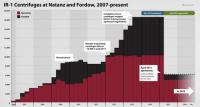-
U.S. police killed or injured more than 55,000 people during “legal interventions” in 2012

U.S. police killed or injured an estimated 55, 400 people during legal stop and search incidents and arrests in 2012, new research finds. Blacks, Native Americans, and Hispanics had higher stop/arrest rates per 10,000 of the population than Whites and Asians. And Blacks were by far the most likely to be stopped, and then arrested, the data show. “As the U.S. struggles to reduce citizen injuries during police contacts, it would seem prudent to train at-risk groups about appropriate behavior during police stops,” the researchers conclude.
-
-
Ex-Treasury official: Hezbollah has turned Lebanese villages into missile silos
Hezbollah has embedded its rocket arsenal in villages across Lebanon, ensuring that any Israeli strike on the Iran-backed terrorist group’s military assets will lead to mass civilian casualties, a former Treasury official said on Monday. Hezbollah has turned the Shiite villages “into essentially missile silos,” Jonathan Schanzer said. “What you have is rockets placed under homes, schools, apartment buildings, etc., so when the Israelis need to try to strike these weapons before they’re launched, it will potentially lead to mass casualties.”
-
-
Most guns recovered by Pittsburgh police not in possession of legal owners
Nearly 80 percent of perpetrators carrying a gun recovered by Pittsburgh Police were not the lawful owners, a strong indication that theft and trafficking are significant sources of firearms involved in crimes in southwest Pennsylvania, a new study finds. The finding suggests a timely opportunity for collaboration between public health and law enforcement officials better to understand and reduce violent crimes involving firearms.
-
-
Studying the basic science of nuclear waste
Approximately 300 million liters of highly radioactive wastes are stored in hundreds of underground tanks at the Hanford Site in Washington and the Savannah River Site in South Carolina. These wastes are extremely complicated mixtures of salts and sludges that have been exposed to ionizing radiation for decades. Their chemistry is dominated by interactions at solid-liquid interfaces that are poorly understood. A more thorough understanding of the chemistry of radioactive waste is key to treating this unwanted byproduct of winning the Second World War and the cold war.
-
-
Hazmat Challenge tests skills of hazardous materials response teams
Ten hazardous materials response teams from New Mexico, Missouri, Oklahoma, and Nebraska test their skills in a series of graded, timed exercises. The event requires participants to respond to simulated hazardous materials emergencies involving aircraft, rail and highway transportation, industrial piping, a simulated radiological release, and a confined space event.
-
-
Syrian asylum-seeker who blew himself up in Ansbach, Germany, was about to be deported
A 27-year old Syrian refugee whose asylum application had been denied, and who was about to be deported to Bulgaria, blew himself up Sunday evening outside a wine bar in the Bavarian town of Ansbach. Twelve people were injured in the explosion, three of them seriously. The past week was a particularly violent week in Germany, with a 21-year-old Syrian refugee knifing a woman to death in the city of Reutlingen on Sunday, and a mentally unstable 17-year old German teenager of Iranian descent, who was obsessed with mass shooting, killing nine people on Friday in a shopping mall in Munich, before turning his gun on himself.
-
-
Report: Next war with Hezbollah could cause “thousands of civilian deaths” in Israel

Israeli officials believe that a future war with Hezbollah, with its advanced Iranian-supplied rocket arsenal, could lead to “thousands of civilian deaths,” according to a new study. Hezbollah is now believed by Israel to possess about 150,000 rockets, which exceeds the combined arsenals of all non-U.S. NATO countries and is ten times larger than its arsenal before the 2006 war.
-
-
Separating the DNA of identical twins
Since its first use in the 1980s — a breakthrough dramatized in recent ITV series “Code of a Killer” — DNA profiling has been a vital tool for forensic investigators. Now researchers at the University of Huddersfield have solved one of its few limitations by successfully testing a technique for distinguishing between the DNA — or genetic fingerprint — of identical twins.
-
-
Secret side deal cuts Iran’s breakout time in half in little more than a decade

Key restrictions on Iran’s nuclear program will ease in slightly more than a decade, cutting in half the time Iran would need to build a nuclear weapons. The AP had obtained a document from a source inside the IAEA — a document which was the only secret portion to last year’s agreement between Iran and the P5+1 powers. The document said that after a period of between eleven to thirteen years, Iran could replace its 5,060 older, and inefficient, centrifuges with up to 3,500 advanced centrifuges.
-
-
U.K. reviews security measures for large outdoor events
Amber Rudd, the new British home secretary, told the House of Commons that she has ordered a full review of the security measures taken to protect large outdoor events such as festivals and other public gatherings. The review comes in the wake of the attack in Nice on revelers celebrating Bastille Day. Rudd said that additional security measures will be put in place, including what is known as the “national barrier asset” when police assess that there is a risk of vehicle attacks.
-
-
3D printing: a new threat to gun control and security policy?
The threat of self-manufactured firearms is not new, but a critical barrier is collapsing. Until recently, most people did not have the skills to make a weapon as capable as commercially available ones. However, recent developments in the field of additive manufacturing, also known as 3D printing, have made home manufacturing simpler than ever before. The prospect of more stringent gun safety legislation is also fueling interest in at-home production. The worst threats 3D printing poses to human life and safety are likely some distance in the future. However, the harder policymakers and others work to restrict access to handguns or unconventional weapons, the more attractive 3D printing becomes to those who want to do harm.
-
-
DHS report highlights R&D priorities for technologies used in the field

The Department of Homeland Security has released the Integrated Product Teams for Department of Homeland Security R&D Fiscal Year 2016 Report. The report identifies twenty-four focus areas for technological research and development (R&D), which fall under five mission areas: aviation security, biological threats, border security, cybersecurity, and counterterrorism.
-
-
The future of naval force and RoboBoats

The future of naval engineering was on display earlier this month, as thirteen teams of high school and college students did battle at the ninth annual RoboBoat Competition in Virginia Beach, Virginia. The competition is a robotics contest where teams program their student-built autonomous surface vehicles to navigate through a series of water-based challenges.
-
-
Shooter motivated by 1960s-era Black Nationalism

Gavin long, 29, who shot and killed three policemen in Baton Rouge before being fatally shot by the police, appears to have been motivated by 1960s-era Black Nationalism, which called on African Americans to take a strong, even violent, stance against mistreatment by authorities. Long left a long trail of on-line material, both postings and videos. In another video, referring to Native Americans, Long said, “When they were extincted [sic] by the same people that run this country, my question to you, just something you can think about: At what point should they have stood up?”
-
-
Coup attempt raises fresh questions about safety of U.S. nuclear stockpile in Turkey

To the extent that news coverage of the coup attempt in Turkey touched on how the coup might affect the U.S. military presence in the country, the focus was on air operations the United States has been conducting against ISIS from the Incirlik airbase in southern Turkey. What was not discussed in the media was the fact that the base is home to the largest stockpile of U.S. nuclear weapons in Europe. The coup was the cause of fresh questions about the safety of these weapons, and the wisdom of storing them in such a vulnerable location.
-
More headlines
The long view
Why Was Pacific Northwest Home to So Many Serial Killers?
Ted Bundy, Gary Ridgway, George Russell, Israel Keyes, and Robert Lee Yates were serial killers who grew up in the Pacific Northwest in the shadow of smelters which spewed plumes of lead, arsenic, and cadmium into the air. As a young man, Charles Manson spent ten years at a nearby prison, where lead has seeped into the soil. The idea of a correlation between early exposure to lead and higher crime rates is not new. Fraser doesn’t explicitly support the lead-crime hypothesis, but in a nimble, haunting narrative, she argues that the connections between an unfettered pollution and violent crime warrant scrutiny.
Bookshelf: Smartphones Shape War in Hyperconnected World
The smartphone is helping to shape the conduct and representation of contemporary war. A new book argues that as an operative device, the smartphone is now “being used as a central weapon of war.”
